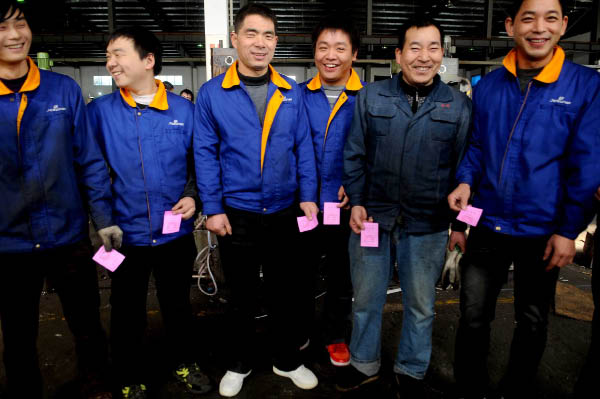Hard and Fast on the Path of Reform
- By Hou Ruili
 0 Comment(s)
0 Comment(s) Print
Print E-mail China Today, February 26, 2014
E-mail China Today, February 26, 2014
| A group of factory workers in Jiaxing, Zhejiang Province, receive their voter registration cards. |
Let the People Decide for Themselves
All people, whether in rural areas, urban communities or enterprises, have the right to vote and to be elected. By being elected as a representative or voting for their trusted representatives, people directly or indirectly express their views, participate in collective decision making and conduct supervision.
Wang Xiangwa's house in Nanposi Village of Gan'gu County in Gansu Province collapsed in an earthquake on July 22, 2013. After discussing the matter, the villagers council agreed to allocate a RMB 20,000 subsidy to Wang's family to rebuild his home.
In May 2013, 90 percent of local villagers attended the Nanposi Village election meeting. They elected 25 representatives to the villagers council and the supervisory committee from 1,650 residents of 358 households. Wang Xiangwa was among those that voted for representatives they believed were suitable for these positions.
This was in complete contrast to the previous situation whereby village cadres made decisions on village matters and merely informed villagers of their decisions. The villagers council, which meets to discuss village matters, now consists of representatives of villagers and four village cadres. Wang Jiwu is one such villager representative on the council. In earlier times, Wang was thinking that it was risky expressing views in a close-knit community. Nowadays Wang and his many fellows on the council can raise any topic they deem relevant to their village.
"In recent years, Yueyang has held democratic discussions and consultations – the indigenous vehicles for democracy. This democratic mode of negotiation effectively expands participation of the common people in China's rural areas," NPC deputy and head of the villagers committee of Fenghuang Village of Yueyang City in Hunan Province Yang Li said.
Liu Jinghua, resident of the Anhuali Community in Anzhen Subdistrict of Beijing, has witnessed similar changes. "Before, the local government would notify us of new policies. It now consults with us before proceeding, and supervises results according to our assessment. This democratic change has made us feel like joint owners of our big home," Liu said. After raising, in her capacity of neighborhood community representative, the matter of insufficient parking space at one meeting of the subdistrict office, the local government responded by adding 200 parking spaces.
Zhu Guoping, secretary of the Hongchu neighborhood committee of Shanghai's Changning District, holds that democracy is an extension of the socialist legal system. She believes democracy in Chinese communities should be manifest in deliberative democracy, whereby the residents handle relevant issues according to negotiations among themselves that lead to unanimous decisions.
"Democracy in companies at the grassroots level should be based on laws guaranteed by effective mechanisms with the system of workers' conferences as a platform for workers' involvement. This can bring the employees' role into full play in an orderly way," member of the National Committee of the CPPCC and chairperson of the National Committee of the Chinese Agricultural, Forestry and Water Conservancy Workers' Union Sheng Mingfu said. "Currently, more efforts should be made to build effective mechanisms, including clarifying the ratio of employees to representatives to guarantee a quorum of participants, weeding out ineligible representatives and motivating and encouraging employees, thus guaranteeing institutionalized democracy," Sheng added.
"Before being elected as representative of my fellow employees, my sole focus here was on making money. But now I can make comments on management as well as matters concerning workers' rights and interests, and raise proposals to the boss on the annual plan and company operation," a worker at the Fujian Jianzhou Group said. "We encourage employees to participate in management and decision-making through democratic management and discussions as well as meetings to exchange ideas," group chairman Yang Renhui said.
However, participation in democracy requires knowledge of the law, a sense of participation, and awareness of one's rights. Sheng Mingfu consequently believes that workers' unions should play its role in guiding employees to pursue democracy through orderly channels.






